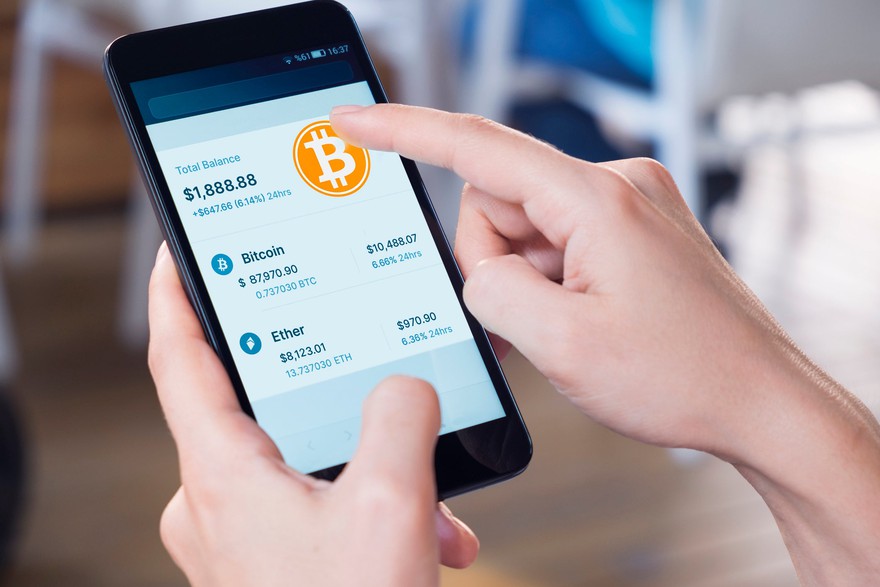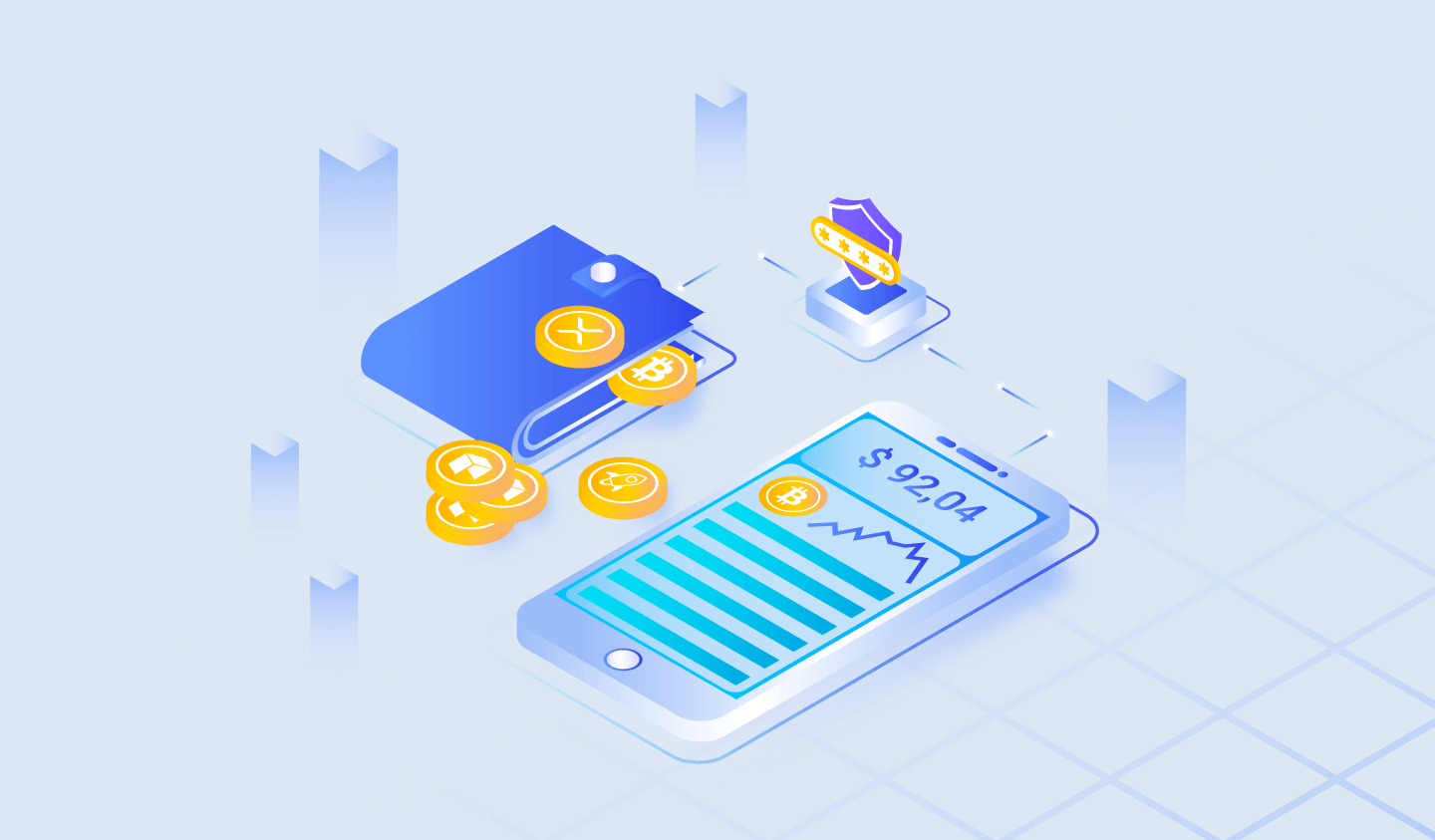A blockchain wallet is a digital wallet that allows you to store, custody, and transact with cryptocurrencies. In today’s world, where crypto has become a popular way to buy, sell, and swap assets, having a secure and reliable wallet is essential.
The key feature of a blockchain wallet is that it is based on distributed ledger technology, which means that the transactions are recorded on a decentralized network of computers. This makes it resistant to hacking and fraud, as the information is spread across multiple nodes in the network.
There are many types of blockchain wallets available, ranging from hardware wallets that resemble USB devices to software wallets that can be installed on your computer or mobile phone. Some popular examples of blockchain wallets include MetaMask, which is an Ethereum-based wallet, and Samsung Blockchain Wallet, which is integrated into Samsung smartphones.

With a blockchain wallet, you can securely store your cryptocurrencies, such as Bitcoin and Ethereum, in one place. You can also use the wallet to buy, sell, and swap your cryptocurrencies, making it a convenient platform for managing your digital assets.
Security is a crucial aspect of a blockchain wallet. It uses cryptographic techniques to protect your private keys, which are used to access your cryptocurrencies. Additionally, most blockchain wallets offer backup and recovery options, so you can restore your wallet in case you lose access to it.
In conclusion, a blockchain wallet is an essential tool for anyone who wants to buy, sell, and transact with cryptocurrencies. It provides a secure and convenient way to store and manage your digital assets, while also offering features such as buying, selling, and swapping cryptocurrencies in one place. With the leading wallet apps available on platforms like Google Play, you can easily access and secure your crypto holdings.
Securely store and transact with your cryptocurrencies using a blockchain wallet. Take control of your digital assets and join the world of crypto today!
- Understanding the Basics of Blockchain Technology
- What is a Blockchain Wallet?
- How Does a Blockchain Wallet Work?
- Popular Blockchain Wallets
- Security Considerations
- Conclusion
- What is a Blockchain Wallet?
- Features of a Blockchain Wallet
- Why Use a Blockchain Wallet?
- Advantages of Using a Distributed Ledger Wallet
- How Does a Blockchain Wallet Work?
- The Importance of Security in Digital Wallets
- 1. Self-Custody Wallets
- 2. Two-Factor Authentication
- 3. Secure Backups
- 4. App Store Verification
- 5. Encryption and Secure Transaction Processing
- Types of Cryptocurrency Wallets
- 1. Software Wallets
- 2. Online Wallets
- 3. Hardware Wallets
- 4. Paper Wallets
- 5. Mobile Wallets
- Choosing the Right Wallet for Your Cryptocurrency
- Types of Wallets
- Key Factors to Consider
- Conclusion
- Managing and Storing Your Cryptocurrency
- Secure Self-Custody Wallets
- Keeping Your Cryptocurrency Safe
- Conclusion
- Future Trends in Blockchain Wallet Technology
- 1. Enhanced Security
- 2. Integration with Traditional Banking System
- 3. Improved User Experience
- 4. Self-Custody Solutions
- 5. Integration of Multiple Cryptocurrencies
- 6. Mobile Wallet Dominance
- 7. Integration of DeFi Features
- Frequently Asked Questions:
- What is a blockchain wallet?
- How does a blockchain wallet work?
- What are the advantages of using a blockchain wallet?
- Are blockchain wallets safe?
- Can I use a blockchain wallet for any cryptocurrency?
Understanding the Basics of Blockchain Technology
Blockchain technology is a distributed ledger system that provides a secure way to store and transfer digital assets, such as cryptocurrencies like Bitcoin and Ethereum. At the core of this technology is the concept of a blockchain, which is essentially a chain of blocks where each block contains a list of transactions.
A blockchain wallet is a digital wallet that allows users to securely store their crypto assets and manage their transactions. It provides a way for users to interact with the blockchain and perform various functions, such as buying, selling, and swapping cryptocurrencies.
What is a Blockchain Wallet?
A blockchain crypto wallet is a software application that enables users to manage their cryptocurrencies in one place. It acts as a digital wallet, allowing users to send, receive, and store their crypto assets. Unlike traditional wallets, which store physical currency, a blockchain wallet stores digital assets.
There are various types of blockchain wallets available, including custodial wallets and self-custody wallets. Custodial wallets are provided by third-party service providers, such as exchanges or wallet apps, that hold the users’ private keys and manage their assets on their behalf. Self-custody wallets, on the other hand, give users full control over their private keys, allowing them to securely manage their assets without relying on third parties.
How Does a Blockchain Wallet Work?
A blockchain wallet works by providing users with a unique address, which they can use to send and receive cryptocurrencies. When a user wants to send a transaction, they create a digital signature using their private key, which proves their ownership of the crypto assets. This transaction is then added to a block and broadcasted to the network for verification.
Once the transaction is verified by the network, it is added to a block and permanently recorded on the blockchain. This ensures that the transaction is secure and cannot be tampered with. The blockchain wallet keeps track of the user’s transactions and provides them with real-time updates on their balances.
Popular Blockchain Wallets
There are several popular blockchain wallets available for users to choose from. Some of the leading wallet apps include:
- Metamask: A popular wallet app that is widely used in the Ethereum ecosystem.
- Blockchain Wallet: A well-known wallet that supports multiple cryptocurrencies and is available on Google Play.
- Samsung Blockchain Wallet: A wallet developed by Samsung that allows users to store and manage their crypto assets.
Security Considerations
Security is a critical aspect of blockchain wallets, as they store valuable digital assets. Users should take several security measures to protect their wallets, such as:
- Using strong and unique passwords.
- Enabling two-factor authentication.
- Regularly updating the wallet software.
- Avoiding suspicious links or downloads.
- Using hardware wallets for additional security.
Conclusion
A blockchain wallet is an essential tool for anyone looking to buy, sell, or store cryptocurrencies. It provides a secure and convenient way to manage digital assets in the decentralized world of blockchain technology. By understanding the basics of blockchain and using reputable wallet apps, users can confidently navigate the world of cryptocurrencies and take full control of their digital wealth.
What is a Blockchain Wallet?
A blockchain wallet is a digital wallet that allows users to securely store and manage their cryptocurrencies. It is also known as a crypto wallet or a wallet app.
Blockchain wallets are based on blockchain technology, which is a distributed and secure system for recording transactions. This technology is the foundation of cryptocurrencies like Bitcoin and Ethereum.
With a blockchain wallet, users can buy, sell, and swap cryptocurrencies, as well as store them. It is similar to a traditional bank account, but instead of holding physical money, it holds digital assets.
There are different types of blockchain wallets available, including self-custody wallets like MetaMask and centralized wallets like those offered by exchanges. Self-custody wallets provide users with full control over their cryptocurrencies, while centralized wallets are managed by a third party.
Features of a Blockchain Wallet
- Buy, Sell, and Swap: Blockchain wallets allow users to easily buy, sell, and swap cryptocurrencies without having to use a separate platform.
- Secure Storage: Blockchain wallets provide a secure way to store cryptocurrencies, protecting them from theft and unauthorized access.
- Multi-Currency Support: Many blockchain wallets support multiple cryptocurrencies, allowing users to manage all their digital assets in one place.
- Integration with Other Wallets: Some blockchain wallets can be integrated with hardware wallets like Ledger for added security.
- Access via Mobile Apps: Many blockchain wallets offer mobile apps for easy access and management of cryptocurrencies on the go. These apps can be downloaded from platforms like Google Play.
Why Use a Blockchain Wallet?
Using a blockchain wallet offers several advantages:
- Security: Blockchain wallets provide a high level of security through encryption and other security measures, making them a safe way to store cryptocurrencies.
- Control: With a blockchain wallet, users have full control over their cryptocurrencies, unlike traditional bank accounts where the bank has control.
- Access to the Crypto World: By using a blockchain wallet, users can participate in the cryptocurrency ecosystem by buying, selling, and storing cryptocurrencies.
- Convenience: Blockchain wallets make it easy to manage cryptocurrencies in one place. Users can buy, sell, and swap cryptocurrencies without the need for a separate platform.
- Decentralization: Blockchain wallets are based on decentralized blockchain technology, which eliminates the need for intermediaries like banks and allows for secure peer-to-peer transactions.
In conclusion, a blockchain wallet is a secure and convenient way to store and manage cryptocurrencies. It provides users with control over their digital assets and access to the world of cryptocurrencies, all in one place.
Advantages of Using a Distributed Ledger Wallet
A distributed ledger wallet, also known as a blockchain wallet, is a software application that allows cryptocurrency users to store and manage their digital assets. Here are some advantages of using a distributed ledger wallet:
- Self Custody: With a distributed ledger wallet, users have complete control and ownership of their crypto assets. This means that they don’t need to rely on a third party, such as a bank or exchange, to store or transact their cryptocurrencies.
- Security: Distributed ledger wallets offer enhanced security features to protect against hacking and fraudulent activities. They utilize encryption algorithms and private keys to secure transactions and store digital assets in a secure manner.
- Convenience: With a distributed ledger wallet, users can easily buy, sell, and swap different cryptocurrencies using a single platform. They can also manage multiple wallets for different cryptocurrencies in one place.
- Compatibility: Distributed ledger wallets are compatible with various cryptocurrencies, including Bitcoin (BTC), Ethereum (ETH), and many others. They can also integrate with popular wallet apps such as MetaMask.
- Privacy: Distributed ledger wallets offer users a certain level of privacy as they can transact cryptocurrencies without revealing their personal information. Transactions are pseudonymous and recorded on the blockchain, providing a certain level of anonymity.
- Global Access: Distributed ledger wallets can be accessed from anywhere in the world, as long as there is an internet connection. This allows users to have full control over their cryptocurrencies regardless of their physical location.
- Evolving Ecosystem: The distributed ledger wallet ecosystem is constantly evolving, with new features and improvements being introduced regularly. Users can benefit from the latest advancements in the world of cryptocurrencies.
- Leading the Cryptocurrency World: Distributed ledger wallets are at the forefront of the cryptocurrency industry. They serve as a gateway for users to participate in the world of cryptocurrencies, enabling them to securely store, transact, and manage their digital assets.
In conclusion, a distributed ledger wallet offers numerous advantages for cryptocurrency users. It provides self custody, enhanced security, convenience, compatibility with various cryptocurrencies, privacy, global access, and participation in the evolving cryptocurrency ecosystem. By utilizing a distributed ledger wallet, users can confidently enter the world of cryptocurrencies and take full control of their digital assets.
How Does a Blockchain Wallet Work?

A blockchain wallet is an essential tool for anyone interested in buying, selling, or swapping cryptocurrencies in the world of digital assets. It serves as a storage space for your digital currencies, allowing you to manage your transactions on the blockchain.
At its core, a blockchain wallet is a software application or a hardware device that securely stores your private keys, which are necessary for accessing and managing your cryptocurrencies. These wallets are designed to interact with the blockchain and enable users to send, receive, and store various cryptocurrencies, including Bitcoin, Ethereum, and many others.
One of the key features of a blockchain wallet is its ability to keep track of your cryptocurrency holdings. Every transaction you make is recorded on the blockchain ledger, which is a decentralized and distributed network of nodes. This ledger ensures that your transactions are secure, transparent, and immutable.
A blockchain wallet brings all your digital assets into one place, allowing you to manage them easily. You can link your wallet to your credit card or bank account, making it convenient to buy, sell, or swap cryptocurrencies. Many wallet apps, such as Metamask, are available on platforms like Google Play and Samsung to help you store and manage your cryptocurrencies.
When you want to buy Bitcoin, Ethereum, or other cryptocurrencies, you can use your blockchain wallet to facilitate the transaction. You can connect your wallet to a cryptocurrency exchange platform and purchase digital currencies using your preferred fiat money or other cryptocurrencies.
One of the main advantages of using a blockchain wallet is self-custody. Unlike traditional bank accounts where you rely on a centralized entity to secure your funds, a blockchain wallet gives you full control and ownership over your digital assets. You are the sole custodian of your private keys, making it more secure and minimizing the risk of theft or hacking.
A wallet based on the blockchain ecosystem provides a secure and user-friendly interface to manage your cryptocurrencies. Whether you want to buy, sell, or store your digital assets, a blockchain wallet offers a safe and reliable solution for managing your cryptocurrency portfolio.
The Importance of Security in Digital Wallets
In the world of cryptocurrencies, digital wallets play a crucial role in storing, buying, selling, and swapping various cryptocurrencies. These wallet apps provide a user-friendly interface and make it convenient for users to manage their cryptocurrency assets.
However, with the increasing popularity of cryptocurrencies, the need for a secure wallet becomes paramount. The security of a digital wallet is crucial as it protects users’ funds and personal information from potential threats and hacks.
There are various security measures that wallet apps should implement to ensure the safety of users’ cryptocurrencies:
1. Self-Custody Wallets
A self-custody wallet is a type of wallet where users have full control and ownership over their private keys. These wallets are based on the concept of “not your keys, not your coins,” meaning that users are responsible for the security of their funds. Self-custody wallets, such as the popular Metamask wallet, provide users with a secure and decentralized way to store and manage their cryptocurrencies.
2. Two-Factor Authentication
Implementing two-factor authentication adds an extra layer of security to digital wallets. With this feature, users need to provide an additional verification code, often sent to their registered email or mobile device, to access their wallet. This ensures that even if someone has access to the user’s password, they cannot log in without the second factor of authentication.
3. Secure Backups
Having secure backups is crucial in case of device loss, damage, or theft. Wallet apps should prompt users to create a backup of their wallet’s seed phrase or private keys and store them in a safe place. This ensures that users can recover their wallets and access their funds even if their device is compromised.
4. App Store Verification
Downloading wallet apps from reputable sources, such as Google Play or Samsung’s app store, provides an added layer of security. These platforms have strict verification processes to ensure that the apps available for download are legitimate and do not contain any malicious code or vulnerabilities.
5. Encryption and Secure Transaction Processing

Wallet apps should encrypt users’ sensitive information and ensure that all transactions are processed securely. This prevents unauthorized access or interception of data during transmission.
The importance of security in digital wallets cannot be overstated. With the increasing popularity and value of cryptocurrencies like Bitcoin and Ethereum, it is crucial for users to choose a secure and reliable wallet to store their assets. By following the recommended security measures, users can have peace of mind knowing that their cryptocurrencies are protected in a secure digital wallet.
Types of Cryptocurrency Wallets
When it comes to storing and managing cryptocurrencies, there are several types of wallets available. Here are some of the leading wallet apps and categories:
1. Software Wallets
Software wallets are digital wallets that you can download and install on your computer or smartphone. They allow you to store, send, and receive various cryptocurrencies, such as Bitcoin, Ethereum (ETH), and others.
- Metamask: A popular software wallet for the Ethereum blockchain.
- Blockchain Wallet: A self-custody wallet that supports multiple cryptocurrencies, including Bitcoin and Ethereum.
- Coinbase Wallet: A mobile app that allows you to store and manage your cryptocurrency holdings.
- Samsung Blockchain Wallet: A built-in wallet on Samsung smartphones, allowing users to securely store and manage cryptocurrencies.
- Google Play and App Store Wallet Apps: Various wallet apps available on the Google Play Store and Apple App Store for managing cryptocurrencies.
2. Online Wallets

Online wallets are wallets that are accessible through the internet. They are hosted by third-party providers and can be accessed from any device with an internet connection. These wallets offer convenience, but users must trust the platform with their private keys.
- Coinbase: An online platform that provides wallet services for buying, selling, and storing cryptocurrencies.
- Binance: A popular cryptocurrency exchange that also offers an online wallet for storing various cryptocurrencies.
- Kraken: Another well-known cryptocurrency exchange that provides online wallet services.
3. Hardware Wallets
Hardware wallets are physical devices that store your private keys offline. They offer enhanced security as they isolate your private keys from potential online threats. Some popular hardware wallets include:
- Ledger Nano S: A USB-based hardware wallet that supports multiple cryptocurrencies.
- Trezor One: Another popular hardware wallet that provides a secure way to store cryptocurrencies.
4. Paper Wallets
Paper wallets are physical printouts or written copies of your cryptocurrency’s public and private keys. They are considered one of the most secure ways to store cryptocurrencies, as they are not vulnerable to online attacks. However, they can be easily lost or damaged, so proper backup and storage precautions must be taken.
5. Mobile Wallets
Mobile wallets are wallet apps designed specifically for smartphones. They offer convenience and portability, allowing users to store, send, and receive cryptocurrencies on the go. Some popular mobile wallet apps include:
- Coinbase: Coinbase’s mobile app provides a secure and easy-to-use platform for managing your cryptocurrency holdings.
- Blockchain Wallet: The mobile version of the Blockchain Wallet allows you to access your funds from anywhere.
Remember, regardless of which type of wallet you choose, it is important to prioritize security and take precautions to protect your cryptocurrency holdings.
Choosing the Right Wallet for Your Cryptocurrency
When it comes to managing your crypto assets, having a secure and reliable wallet is essential. A cryptocurrency wallet is a digital app or device that allows you to store, buy, sell, and swap your various cryptocurrencies in one place. It provides you with the necessary tools to manage your crypto holdings and provides a layer of security for your digital assets.
Types of Wallets
There are different types of wallets available, each with its own strengths and weaknesses. Here are some popular options:
- Crypto Wallet Apps: These are mobile or desktop applications that you can download from app stores like Google Play or the Apple App Store. Examples include the Metamask and Blockchain Wallet apps. They allow you to store, buy, sell, and swap a wide range of cryptocurrencies such as Bitcoin and Ethereum.
- Hardware Wallets: These are physical devices that resemble USB drives. They offer extra security by keeping your private keys offline, making it harder for hackers to access your funds. Ledger is one of the leading hardware wallet manufacturers.
- Web Wallets: These wallets are based on cloud storage and can be accessed from any device with an internet connection. They offer convenience but can be less secure compared to other types of wallets. Examples include wallets provided by cryptocurrency exchanges.
- Paper Wallets: These are physical copies of your cryptocurrency keys printed on paper. They are secure since they are not connected to any network, but can be easily lost or damaged.
Key Factors to Consider
When choosing the right wallet for your cryptocurrency, there are several key factors to consider:
- Security: Look for wallets that offer strong security features, such as two-factor authentication and encryption. Hardware wallets are generally considered the most secure option.
- User-Friendliness: Consider your own technical skills and choose a wallet that is user-friendly and easy to navigate.
- Supported Cryptocurrencies: Make sure the wallet you choose supports the cryptocurrencies you intend to store or trade.
- Platform Compatibility: Check if the wallet is compatible with your device’s operating system, whether it’s iOS, Android, or Windows.
- Self-Custody: Consider whether you want to have full control over your private keys or if you are comfortable with a custodial wallet, where a third party manages your keys on your behalf.
Conclusion
Choosing the right wallet for your cryptocurrency is crucial for the security and convenience of managing your digital assets. Consider factors such as security, user-friendliness, supported cryptocurrencies, platform compatibility, and self-custody when making your decision. With the right wallet, you can confidently buy, sell, and swap cryptocurrencies in a secure and efficient manner.
Managing and Storing Your Cryptocurrency
When it comes to managing and storing your cryptocurrency, having a reliable and secure wallet is essential. A blockchain wallet is one of the leading options available for users to store and transact their digital assets securely.
With a blockchain wallet, you can store multiple cryptocurrencies like Bitcoin (BTC), Ethereum (ETH), and more in one place. This eliminates the need to have multiple wallets for each cryptocurrency, making it convenient and easy to manage your holdings.
There are various wallet apps available for download on platforms like Google Play and Samsung Galaxy Store. These wallet apps provide a user-friendly interface and allow you to buy, sell, and swap cryptocurrencies directly from your mobile device.
Secure Self-Custody Wallets
Blockchain wallets are designed to prioritize security and give users full control over their funds. With a self-custody wallet, you hold the private keys to your cryptocurrencies, ensuring that you have complete ownership and control over your digital assets.
Popular self-custody wallet options include MetaMask, the leading Ethereum wallet. MetaMask is available as a browser extension and mobile app, making it easy to access your wallet and securely interact with the Ethereum blockchain.
When using a blockchain wallet, you can securely buy, sell, and swap cryptocurrencies without relying on a centralized exchange. This eliminates the need for intermediaries and puts you in control of your transactions.
Keeping Your Cryptocurrency Safe
When it comes to the security of your cryptocurrency, it’s important to take additional precautions. Here are some tips to keep your funds safe:
- Choose a wallet with robust security features and a strong reputation in the crypto community.
- Use hardware wallets for an extra layer of security. These devices store your private keys offline and protect them from potential online threats.
- Enable two-factor authentication (2FA) to add an additional layer of security to your wallet.
- Regularly update your wallet and operating system to ensure you have the latest security patches.
- Be cautious of phishing attempts and only access your wallet through official channels.
By following these best practices, you can ensure the safety and security of your cryptocurrency holdings.
Conclusion
A blockchain wallet provides a secure and convenient way to manage your cryptocurrency holdings. With a wide range of wallet options available, you can choose the one that best suits your needs and preferences.
By utilizing a self-custody wallet and following security best practices, you can confidently buy, sell, and store your cryptocurrency in a world where digital assets are becoming increasingly important.
Future Trends in Blockchain Wallet Technology
As the use of cryptocurrencies continues to grow, the technology behind blockchain wallets is constantly evolving. Here are some future trends that we can expect to see in blockchain wallet technology:
1. Enhanced Security
Security is always a top concern when it comes to blockchain wallets. Future wallet blockchain technology will focus on enhancing security measures to protect users’ assets. This can include features such as multi-factor authentication, biometric authentication, and advanced encryption algorithms to ensure the safety of digital assets.
2. Integration with Traditional Banking System
To make cryptocurrencies more accessible to the general public, future blockchain wallets will aim to integrate with traditional banking systems. This will allow users to link their wallet to their card, bank account, or mobile payment apps, making it easier to buy, sell, and swap cryptocurrencies directly from their existing financial accounts.
3. Improved User Experience
Wallet apps will be developed with a user-friendly interface to provide a seamless and intuitive experience. These apps will be designed to simplify the process of buying, storing, and managing cryptocurrencies. One example is the Metamask blockchain wallet, which allows users to interact with decentralized applications (dApps) on the Ethereum blockchain within a single interface.
4. Self-Custody Solutions
Future blockchain wallets will offer self-custody options, giving users complete control and ownership over their digital assets. Self-custody means that users hold their own private keys, eliminating the need to rely on third-party custodians for storing their cryptocurrencies. This decentralized approach is aligned with the distributed nature of blockchain technology.
5. Integration of Multiple Cryptocurrencies
To cater to the growing number of cryptocurrencies in the market, future blockchain wallets will support a wider range of digital assets. Users will be able to store and manage not only Bitcoin and Ethereum but also various other cryptocurrencies in a single wallet. This will provide users with a convenient and unified platform to manage their diverse crypto portfolios.
6. Mobile Wallet Dominance

With the proliferation of smartphones, mobile wallet apps will dominate the blockchain wallet landscape. Wallet apps available on platforms like Google Play and Samsung App Store will continue to expand, offering users a secure and convenient way to buy, sell, and store their cryptocurrencies on the go.
7. Integration of DeFi Features
Decentralized Finance (DeFi) has gained significant traction in recent years, and future blockchain wallets will integrate DeFi features. This will enable users to participate in various DeFi protocols, such as lending, borrowing, and yield farming, directly from their wallets. This integration will further expand the functionalities of blockchain wallets within the digital ecosystem.
In conclusion, the future of blockchain wallet technology is bright. Wallets will continue to evolve to provide enhanced security, seamless integration with traditional banking systems, improved user experiences, self-custody solutions, support for multiple cryptocurrencies, dominance of mobile wallet apps, and integration of DeFi features. As the world embraces cryptocurrencies, blockchain wallets will play a vital role in facilitating secure and convenient transactions in the digital realm.
Frequently Asked Questions:
What is a blockchain wallet?
A blockchain wallet is a digital wallet that allows users to securely store, send, and receive cryptocurrencies. It consists of a pair of cryptographic keys: a public key that is used to receive funds and a private key that is used to sign transactions and access the funds.
How does a blockchain wallet work?
A blockchain wallet works by utilizing cryptography to create a pair of keys: a public key and a private key. The public key serves as the address to which funds can be sent, while the private key is used to sign transactions and access the funds. When a transaction is made, it is broadcasted to the blockchain network and validated by network participants before being added to the blockchain.
What are the advantages of using a blockchain wallet?
There are several advantages to using a blockchain wallet. First and foremost, it provides users with full control and ownership of their funds. Blockchain wallets are also secure, as they use cryptography to protect the private keys. Additionally, transactions made with a blockchain wallet are typically faster and cheaper compared to traditional banking systems.
Are blockchain wallets safe?
Yes, blockchain wallets are generally considered safe. However, it is important to take proper security measures to protect your private keys. This includes using strong passwords, enabling two-factor authentication, and keeping your private keys offline in a hardware wallet. It is also important to be cautious of phishing attacks and only use trusted wallet providers.
Can I use a blockchain wallet for any cryptocurrency?
Most blockchain wallets are designed to support multiple cryptocurrencies. However, it is important to check the wallet’s compatibility with the specific cryptocurrency you want to use. Different cryptocurrencies may have different wallet options available, so it is recommended to choose a wallet that supports the specific cryptocurrencies you plan to use.







